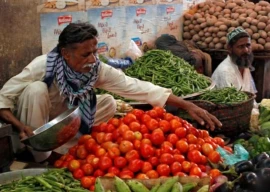
The group of some 40 herders from the same village in South Punjab brought 500 goats with them. For herders such as these, sales over the next couple of weeks before Eid make up a substantial portion of their annual income.
But exhausted by the long journey, they thought only about resting in the tents at the market set up by the government to accommodate animal traders from out of town.
Except there were no tents and there was no market. Unbeknownst to Ali and his companions, the city government had decided that day to shift the proposed market site some 10 miles away to Youhanabad. Worse, the police tried to fine him for bringing the herd to an area without an animal market.
With Eid just two weeks away, arrangements to set up special markets for the sale of sacrificial animals have still not been firmed up. And the plan itself remains uncertain, with the Lahore High Court considering a plea from an association of animal traders challenging the shifting of a cattle market on Bund Road to Shahpur Kanjaran.
The city government says the markets are being moved to ease traffic congestion in parts of Lahore. The goat herders from Sadiqabad don’t mind designated animal markets, but they mind the disorganisation.
Moheb Ali was able to escape the police fine. “They tried to take four of my goats but I negotiated with them and gave them a small payment instead,” he said. They then pointed him in the direction of the new market.
The group walked to the new site near Ibrahimi Masjid in Youhanabad.
They found no market, no tents. So 50 men and 500 goats settled onto the pavement around a factory to spend the night.
By the morning, he was being confronted by the local station house officer and factory employees. “I told these people not to settle here and to go away,” said the SHO.
“We are worried,” said Ali. A day since arriving in Lahore, they had no place to stay, they didn’t know where the cattle market was, and they had lost money to the police.
“We have nothing. No water. They (police) took our goats and everywhere they tell us to get our things and get out,” said Saleem, who also arrived on Tuesday. “We have seen no government accommodation yet.”
The herders also felt that restricting the sale of animals to designated markets would hurt their business. “These bazaars are so far away. People won’t be willing to travel to these locations,” said Ali.
Naeem, an onlooker at the scene, was concerned that the travails of the herders would add to the price of their wares. “They have travelled all the way from the Punjab border. These types of mishaps will add to their costs.”
Earlier, the Gulberg Town municipal officer had told The Express Tribune that banners would be installed all over town with the addresses of the selling points. And not only would the traders get accommodation at the markets, but clean water and bathroom facilities as well, he said.
The city government initially announced it was setting up seven markets, but at Tuesday’s meeting decided to set up nine.
City government officials said that the markets had been located outside the Ring Road, because of concerns that the damage that such markets could do to green spots near sections of the Ring Road, on which many millions of rupees have been spent.
An official at the Gulberg TMO office said on Tuesday that the selling point would be functional in a few days, adding that most people buy animals in the last week before Eid. The government has also banned the use gas cylinders to burn animal hair.
He said that the TMO had formed a patrolling squad to make sure that vendors do not set up stalls in prohibited areas. Most vendors, he said, entered the city after midnight to avoid being checked. Traders who set up shop in prohibited areas are liable to fines and confiscation of their animals, he said.
Published in The Express Tribune, November 5th, 2010.

















COMMENTS (1)
Comments are moderated and generally will be posted if they are on-topic and not abusive.
For more information, please see our Comments FAQ